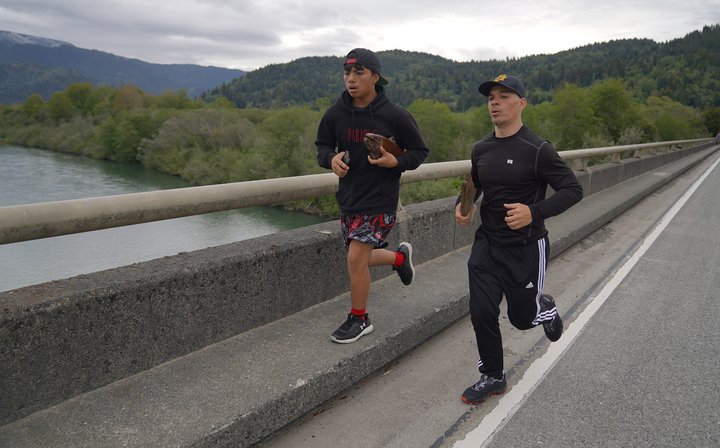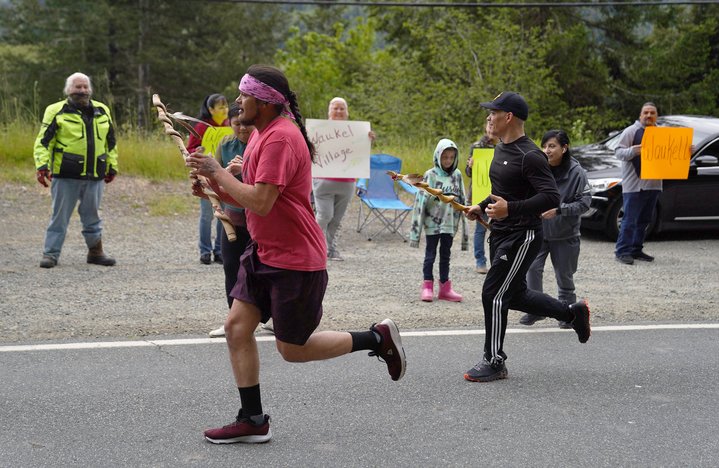WRO Staff / Thursday, May 12, 2022 @ 1:38 p.m.
Native Runners Kick Off Annual 340-Mile Klamath Salmon Run This Morning, Bringing Awareness to the Plight of the River
Photos: Yurok Tribe.
Press release from the Yurok Tribe:
To kick off the Annual Klamath Salmon Run in a good way, several Yurok families shared traditional prayers of gratitude this morning before dipping hand-carved salmon into the Pacific Ocean and taking the first steps of the 340-mile relay from the mouth of the Klamath River to its headwaters. “For millennia, the Klamath salmon supported our communities from the headwaters to the coast. As Tribes recover our roles as the caretakers of the Klamath and the dams are removed, I am optimistic about the future of the river and all of the people who depend on it,” said Yurok Vice Chairman Frankie Myers.
"Actions taken today will affect the future of our people for many generations to come as it relates to our ability to maintain our way of life and identity so what better way to bring awareness to these important issues than to carry the torch during the annual salmon run using the energy, enthusiasm, and heart that our people have always shown in defending our rights and way of life. It's very good to see," added Joe Davis, the Hoopa Valley Tribe's Chairman.
“The salmon have been the main food source for the Karuk People since time immemorial. I tip my cap to all, young and old, who are participating in the Klamath River Salmon Run to bring awareness to a river sick with pollution. I look forward to telling our Elders we will have salmon again, I look forward to telling our Youth we will have salmon for generations to come.,” said Karuk Chairman Russel “Buster” Attebery.
“The Klamath Salmon Run is always extremely empowering, but this year’s event is extra special because it is a celebration of our collective efforts to heal the river and our communities,” said Yurok citizen and event organizer Annelia Hillman. “There is finally hope that we will soon see wild salmon return the upper basin.”
Extending from Northern California to southeastern Oregon, the tribally organized four-day relay traces the pre-dam migratory path of adult Klamath salmon. From the river’s terminal end on the Yurok Reservation, the Salmon Run route travels through Hoopa and Karuk lands before it concludes at the headwater springs of the high mountain desert in Klamath Tribes of Oregon territory. The annual event draws hundreds of runners, including whole families, who complete specific sections of the relay. Throughout the four-day journey, tribal participants pray together, strengthen relationships and advocate for the river.
Tribal youth organized the first Klamath Salmon Run after the catastrophic fish kill in 2002 when poor water management decisions, coupled with the dams’ negative influence on river conditions, led to a disease outbreak which killed more than 60,000 adult salmon. Following the devastating fish kill, members of the four tribes launched a far-reaching campaign to remove the lower four Klamath River dams and solve the river’s water allocation issues. After 20 years of tireless advocacy and direct actions, the intertribal coalition is about to achieve its most ambitious objective. The Draft Environmental Impact Statement on the decommissioning of the four dams is nearly complete, which represents the last big step before removal can begin. Construction crews are prepared to start work when regulators give the greenlight later this year.


CLICK TO MANAGE